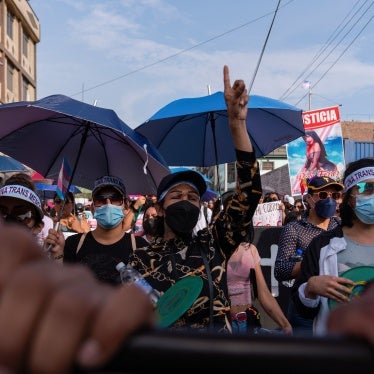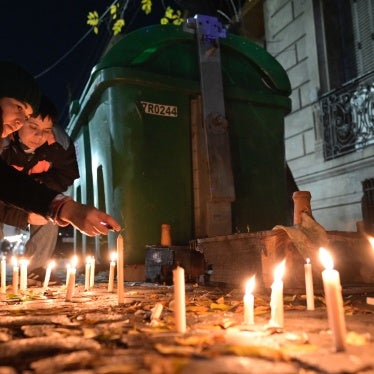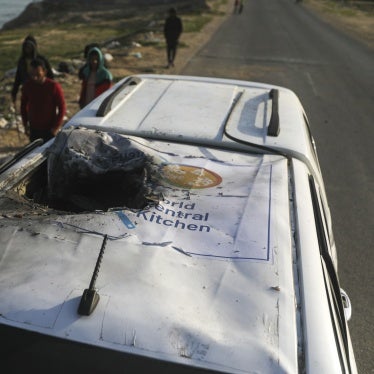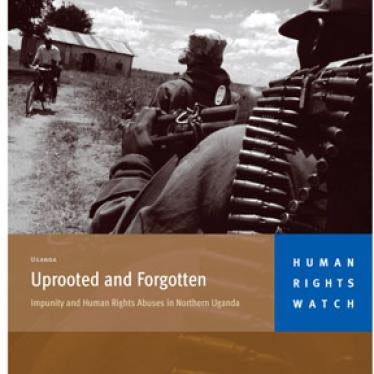(New York) - In its upcoming presidential statement on the Juba peace talks, the United Nations Security Council should call on Uganda’s government, the rebel Lord’s Resistance Army and the international community to continue to work toward a peace agreement that respects human rights, and includes prosecutions of those responsible for war crimes and crimes against humanity in accordance with international standards.
Today, the Security Council is expected to adopt its presidential statement on the peace talks mediated by the regional government of Southern Sudan, which have been taking place in the Sudanese town of Juba since July 14. The talks hold promise for ending the 20-year conflict, the brunt of which has been borne by the civilian populations of northern Uganda and southern Sudan. In northern Uganda, 1.7 million people remain displaced by the conflict and are living in dire humanitarian conditions.
"Ending the conflict is crucial for the people in northern Uganda and Southern Sudan who have suffered so egregiously for nearly two decades," said Richard Dicker, director of Human Rights Watch's International Justice Program. "Fair and credible prosecutions for the most serious crimes are an essential component to building a durable peace, and must be part of any outcome."
Human Rights Watch has long documented human rights violations committed by the Lord's Resistance Army (LRA), including torture, sexual abuse, forced recruitment through the abduction of children, and forcing children to kill even members of their own families. Human Rights Watch has also documented abuses by Ugandan government forces, including the killing, raping and beating of civilians. Human Rights Watch has consistently urged for an end to abuses and for perpetrators on both sides to be brought to justice.
In July 2005, the International Criminal Court (ICC) issued warrants against five senior LRA leaders for war crimes and crimes against humanity.
"ICC warrants for LRA leaders accused of widespread murder, sexual slavery and the brutalization of children have been an important step toward ensuring justice is done," said Dicker. "Fair and credible prosecutions are not simply mandated by international treaties, but are crucial to building respect for the rule of law."
International law requires accountability for the most serious crimes. The United Nations Convention Against Torture, the Geneva Conventions, and the ICC's Rome Statute all require fair prosecutions for crimes against humanity and war crimes. Uganda is a party to these treaties. In addition to prosecutions for the most serious crimes, states should support broader accountability efforts for lesser offenses through national and local initiatives that would include trials, a truth-telling exercise, and, where appropriate, use of traditional mechanisms.
Some civic, traditional, and religious leaders in northern Uganda have suggested that traditional justice measures should be utilized as an alternative to ICC prosecutions for crimes committed in northern Uganda. Traditional justice measures may have an important role to play in broader accountability efforts, but they are unlikely to provide prosecution accompanied by fair-trial guarantees as required under international law for serious crimes. These include the right to a fair and public hearing by an independent and impartial tribunal and the presumption of innocence.
A range of other human rights issues are affected by the ongoing negotiations. Human Rights Watch called on the Security Council to monitor LRA leader Joseph Kony's reported intention to respond within the month to the demand for the release of women, children and other noncombatants that was recently made by the UN undersecretary-general for humanitarian affairs, Jan Egeland. Human Rights Watch also called on the Ugandan government and its donor country partners to translate plans for relief and reconstruction efforts into concrete improvements in the protection of human rights in northern Uganda.
Background
The conflict in northern Uganda to depose President Yoweri Museveni began immediately after he took power by force in 1986. In December 2003, Museveni invited the ICC to investigate the LRA. In July 2005, the court issued warrants for the arrest of the top five LRA leaders -Vincent Otti, Okot Odhiambo, Raska Lukwiya and Dominic Ongwen as well as Joseph Kony - for crimes including widespread or systematic murder, sexual enslavement, and rape, and war crimes such as intentionally attacking civilians and abducting and enlisting children under the age of 15. Lukwiya was reportedly killed in August.
Uganda: UN Should Stress Peace, Justice Go Hand in Hand
Security Council to Issue Statement Welcoming Juba Talks
Your tax deductible gift can help stop human rights violations and save lives around the world.
Most Viewed
-
May 9, 2024
Sudan: Ethnic Cleansing in West Darfur

-
May 15, 2024
Peru Chooses Bigotry in Medical Services

-
November 25, 2019
A Dirty Investment

-
May 14, 2024
Lesbian Women Set on Fire in Argentina

-
May 14, 2024
Gaza: Israelis Attacking Known Aid Worker Locations



